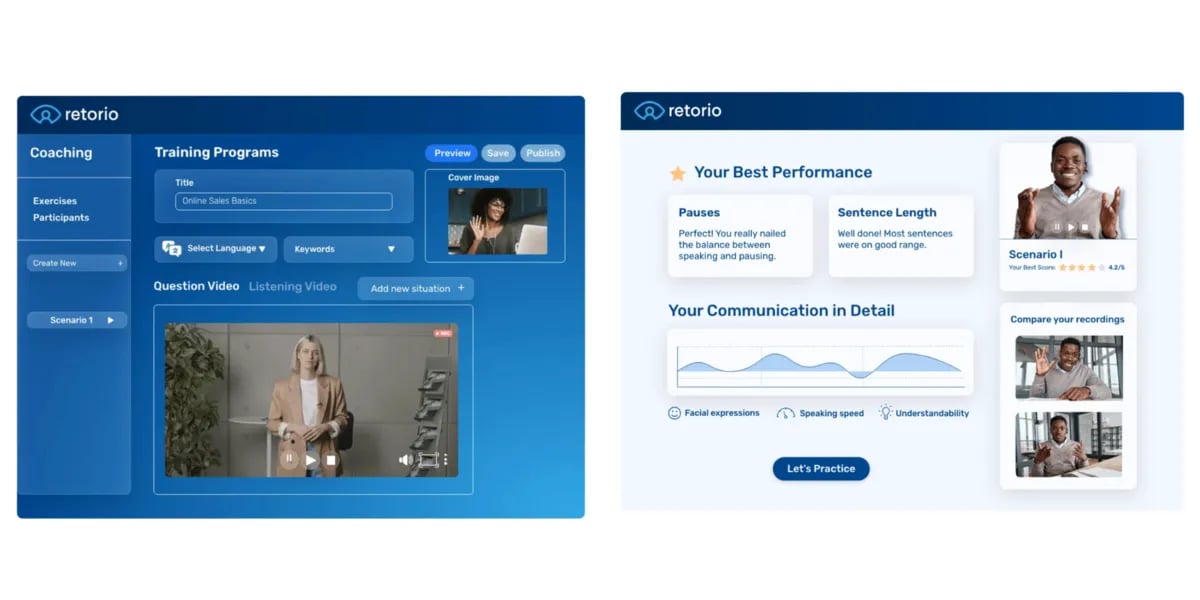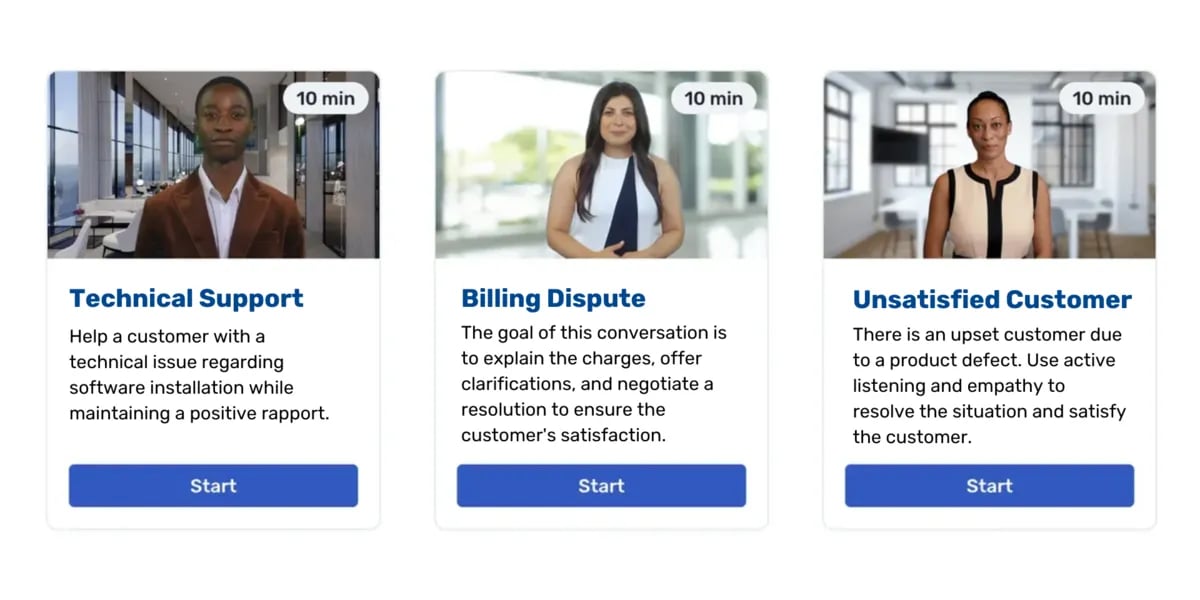Facing rejections and handling objections is a huge part of a sales professional's day, no matter how seasoned a rep may be.
However, what differentiates good sales professionals from great ones lies in how well they can handle sales objections, navigate through those objections, and ultimately find a solution to satisfy the customer.
The Reality of Sales Objections
In fact, when buyers have objections and the sales rep can satisfy them, their success rate is 64%. Conversely, failure to handle these moments often leads to stalled deals and longer sales cycles.
So how can businesses establish effective objection handling training programs for their sales reps?
What's in this post:
What is objection handling in sales?
Objection handling is a natural part of the sales process. How to go about the objection handling process during a sales pitch and listening to the prospect's concerns in order to handle objections effectively is the skill that sets a great sales professional apart from the rest.
Sales objections arise from a number of different factors during the buying process but are often excuses in disguise for other meanings. To navigate this, reps need high "Behavioral Intelligence"—the ability to read facial expressions, tone of voice, and sentiment.
According to Cognism, the most common types of sales objections usually fall into four specific buckets. Below, we break down these objections and provide actionable scripts on how to pivot the conversation.
| Objection Type | Hidden Meaning | How to Pivot (Script) |
|---|---|---|
| 1. Price Objection | "I don't see enough ROI to justify this cost yet." | "I completely understand that budget is a primary concern. If we could put price aside for one moment, does this solution actually solve the [Specific Pain Point] you mentioned earlier? If so, let's look at how the ROI offsets the initial investment." |
| 2. Lack of Authority | "I am hesitant to present this to my boss because I don't trust you yet." | "That makes sense—typically, [Job Title] also needs to sign off on this. To help you present this to them, what are the top 3 metrics they care about most right now? I can help prepare a summary specifically for them." |
| 3. Lack of Need | "I don't understand how this applies to my current problems." | "I hear you. Many of our current partners felt the same way until they realized we could automate [X Process]. Just to be sure I'm not wasting your time, how are you currently handling [Specific Pain Point]?" |
| 4. Lack of Urgency | "This isn't a priority because the pain isn't big enough." | "That's fair. If you decide to wait 6 months to address this, what is the estimated cost of [Problem] continuing unchecked? Is that a cost the business is comfortable absorbing?" |
Want to learn more about how your reps can improve their value-based selling skills? Check out the full article here.
What is objection handling training?
Customer objections in sales happen in virtually every sales conversation. In order for sales professionals to close more sales deals and for businesses to make more revenue, understanding the most common sales objections, and fine-tuning objection-handling skills are paramount factors.
However, traditional training methods—like passive video watching or high-pressure role-plays with managers—often fail to transfer skills to real life. This is where AI Simulation Training (often called a "Flight Simulator" for sales) bridges the gap.
Does Training Actually Work? The Data Says "Yes"
21x
More conversation practice achieved by Pharma advisors using AI simulations.
38%
Increase in ramp-up speed for sales reps at Vodafone (VOIS).
€650k
Annual savings generated by Nürnberger Insurance through AI training efficiencies.
So how can you ensure your sales reps are receiving constant sales training that perfects their objection-handling skills so they see more success?
One of the ways companies are setting themselves apart in this competitive business landscape is how well they're training their sales reps, and AI-powered sales training platforms are seeing huge growth in adoption to do just this.
 With AI-powered sales training, a sales professional can train their skills on-demand in a psychologically safe space, and receive personalized feedback based on their performance.
With AI-powered sales training, a sales professional can train their skills on-demand in a psychologically safe space, and receive personalized feedback based on their performance.With AI-powered sales training platforms, businesses can:
-
Provide a "Flight Simulator" Experience: Just as pilots train in simulators before flying real planes, sales reps use immersive video simulations to practice high-stakes conversations without burning leads.
-
Enable Psychological Safety: Reps often fear judgment when role-playing with managers. AI provides a judgment-free zone where they can fail, retry, and improve repeatedly.
-
Scale Best Practices: You can clone your top performers' objection-handling techniques and turn them into training scenarios for the entire team.
Top 10 objection handling training technique examples
Effective training isn't just about memorizing lines; it's about internalizing concepts. Here are the top 10 techniques that modern sales teams are using to upskill their representatives.
1. The "Empathy First" Approach
First and foremost, leading with empathy is central to every successful sales effort. Dealing with prospects' concerns requires reps to first show they completely understand the prospect's point of view using phrases like "I completely understand why you'd feel that way..." before moving forward.
2. Provide Social Proof (The Bandwagon Effect)
Often, potential customers just need to build trust and credibility. Training reps to seamlessly weave in case studies (e.g., "Client X faced this exact challenge and solved it by...") effectively neutralizes risk aversion.
3. Question and Clarify (The Onion Method)
Peel back the layers. Asking the prospective buyer clarifying questions ("Can you tell me more about why that is a concern?") allows reps to get to the root pain point rather than solving a surface-level symptom.
4. Offer Alternatives
The technique of offering the potential customer alternatives is an effective way of handling objections. If price is the issue, can the scope be adjusted? If timing is the issue, can a pilot be arranged? Flexibility kills objections.
5. Underscore USPs (Unique Selling Points)
Highlighting exactly why your product or service is a better alternative to competitor alternatives is a common objection-handling technique. This requires deep product knowledge training so reps don't just list features, but explain benefits.
6. Reframe the Objection
This is a powerful technique where the rep changes the way the potential customer sees their own objection. For example, if a client says "This is too complicated," the rep reframes it as "It is robust because it replaces three other tools you currently pay for."
7. Ask Probing Questions
It's not uncommon for reps to encounter an objection with a vague reason. Reps need to ask open-ended questions to figure out if the objection is real or a smokescreen. (e.g., "If we solved for X, would there be any other reason holding us back?").
8. Offer a Trial or Pilot Options
When reps encounter an objection due to prospects being hesitant about committing, offering a trial of the product or service effectively lowers the barrier to entry.
9. The Boomerang Technique
The boomerang technique involves taking the objection and turning that into the very reason to buy. For example, when a prospect says "We don't have time for training," the rep responds, "That is exactly why you need this—our tool reduces onboarding time by 40%, giving you more time back."
10. Visual Confirmation
Sometimes a sales objection stems from a lack of clarity. Using visual aids, screen shares, or dynamic ROI calculators during the call can instantly clear up confusion that words cannot.
Role-Play Scripts: The "Flight Simulator" Approach
Though objection handling in sales is essential, customer service reps also face objections daily. The line between Sales and Service is blurring—Customer Service is often the "second sale."
Using AI-powered training, companies like **Vodafone (VOIS)** transformed their customer care onboarding. By moving away from passive learning to active simulation, they achieved a **69% reduction in coaching effort** while increasing quality.
Traditional Roleplay vs. AI Simulation
🚫 Traditional Human Roleplay
- High pressure (fear of failure).
- Difficult to schedule/scale.
- Subjective feedback ("I think you did okay").
- One-and-done (rarely repeated).
✅ Retorio AI role plays
- Psychologically safe environment.
- Available 24/7 on-demand.
- Objective data (Multimodal analysis of tone, pace, sentiment).
- Infinite retries until mastery.
How to master objection handling training
Ensuring sales professionals, as well as customer service reps, develop good objection-handling skills comes down to the quality of their training. Sales performance is heavily dependent on the quality of training.
Retorio’s Behavioral Intelligence Platform takes training a step further. It doesn't just analyze what you say (the transcript), but how you say it (the delivery).
Through multimodal analysis, the AI evaluates:
- Verbal: Are you using "doubt words" or "hedging language"?
- Voice: Do you sound confident, or is your voice pitch indicating stress?
- Visual: Does your body language convey openness and active listening?
This gives them the chance to practice over and over their objection-handling skills within a real conversation, whilst receiving personalized feedback to improve their performance. When reps perfectly handle objections with realistic AI simulations before talking to real prospects, they are able to build confidence and fluency to navigate through the sales conversation and see success.
Ready to transform your team's performance? Ensure every sales rep is equipped with the skills they need to handle every sales objection and turn it into an opportunity to sell value and close the deal.
Try out Retorio's AI Coaching Platform today, and see what it could do for your sales teams today!
Due to their interactive features that keep learners interested, AI-powered video simulations are increasingly being acknowledged as a successful technique of staff training.
Falling engagement levels are one of the major problems with remote L&D (learning and development). According to a 2023 LinkedIn Learning Report, leaders at firms place the most focus on "keeping employees motivated and engaged" throughout the year. Engagement has become an increasingly important demand, especially with the requirement to provide training in remote situations. With the help of AI simulations, students can practice in a setting that is psychologically safe while also having the opportunity to practice skills that they will require in real-world scenarios.
With AI-powered training, such as Retorio's Behavioral Intelligence Platform, training vital sales skills online, such as handling objections, has never been easier.
Unlike typical online training platforms, that tend to lack engagement and interactive features, AI-powered sales training platforms provide tailored feedback as the learner trains, provides further training modules based on performance and uses avatars that facilitate engaged learning.
Learners are encouraged to engage in free speech, actively retrieving knowledge and responding in real-time, mirroring real-life situations, making training incredibly effective.
Sales coaching identifies skill gaps, provides personalized feedback, and equips reps with practical techniques (e.g., objection handling, closing strategies). Platforms like Retorio use AI simulations to reinforce these skills, leading to higher conversion rates and revenue.
Top techniques include:
-
Feel-Felt-Found: “I understand how you feel. Others felt the same, but found [benefit].”
-
Reframing: Turn objections into opportunities (e.g., “If budget is a concern, let’s discuss a phased payment plan.”).
-
Preemptive Strikes: Address objections before they arise in your pitch.
-
“It’s too expensive.”
-
“I need to think about it.”
-
“I’m happy with my current provider.”
-
“Send me more info.”
-
“This isn’t a priority right now.”
-
“I don’t see the value.”
-
“Let me talk to my team.”
While some platforms offer limited free trials, Retorio provides customizable, enterprise-grade simulations.
-
Empathize: “I understand budget is a concern.”
-
Reframe value: “Let’s discuss how this solution saves you $X long-term.”
-
Offer flexibility: Payment plans, discounts, or phased implementation.
Yes. Retorio’s AI Coaching Generator allows you to upload custom scripts and scenarios, making it ideal for insurance, SaaS, retail, and more.
Yes. Train reps in German, English, Spanish, and other languages with Retorio’s AI avatars and simulations.
Retorio’s AI analyzes your CRM data to create hyper-realistic scenarios. For example, if reps struggle with “I need to think about it,” Retorio generates simulations to practice urgency-driven closes.
Yes. Retorio’s Impact Reporting shows how reps improve over time, including metrics like objection resolution rates and customer satisfaction.






